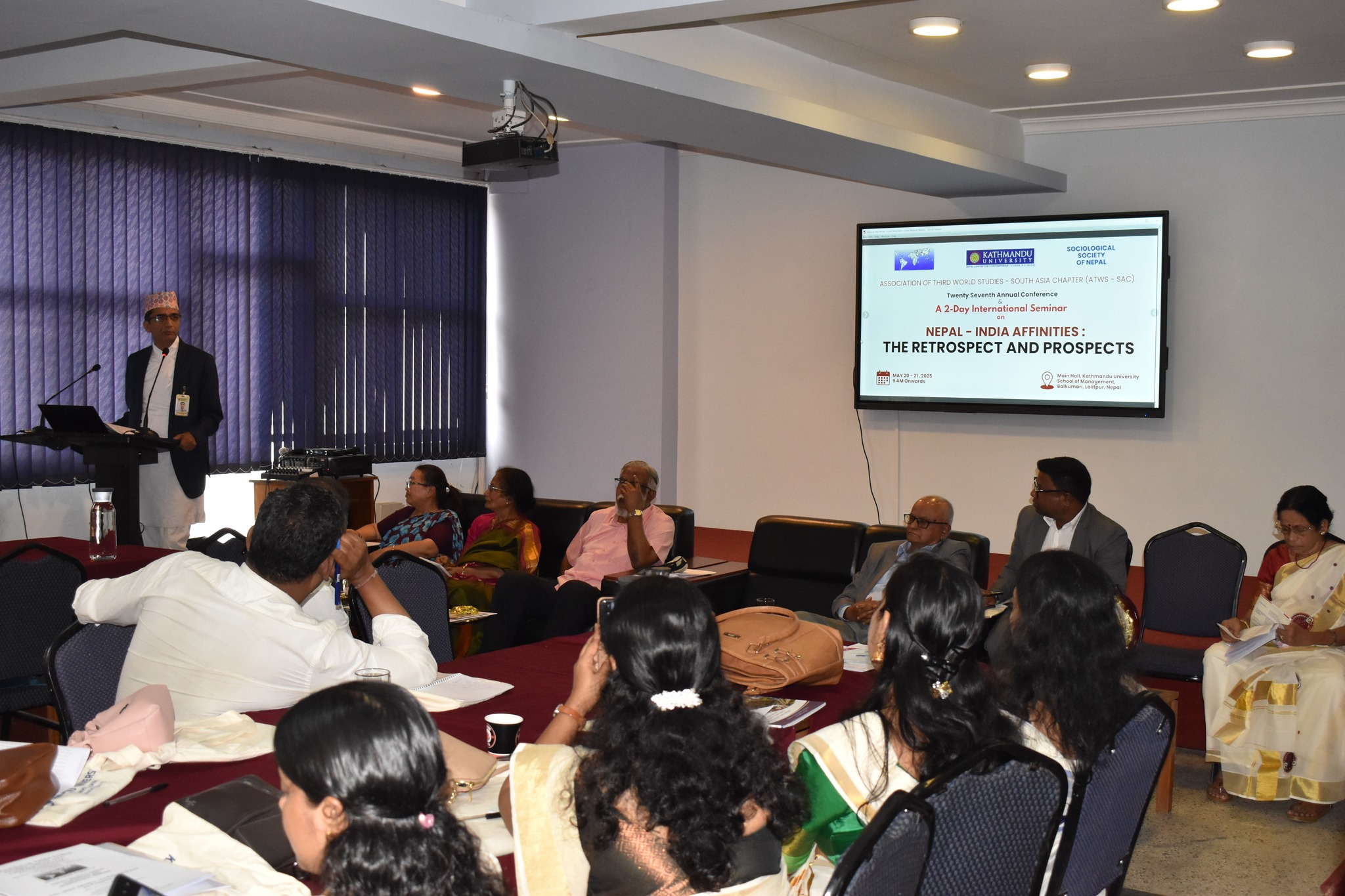KATHMANDU, May 30: A two-day international seminar titled “Nepal–India Affinities: The Retrospect and the Prospect” concluded this week, focusing on revitalizing the historic Nepal-India relationship through South-South academic dialogue.
Held on May 20–21 at the School of Arts, Kathmandu University, the seminar brought together over 100 scholars, researchers, and academics from Nepal and various parts of India. The seminar aimed at promoting people-to-people relations between Nepal and India, particularly through sociological knowledge and shared cultural values. A notable feature of the event was the presence of more than 60 participants from different Indian states, including Kerala, Tamil Nadu, Bihar, Uttar Pradesh and Telangana, signaling a significant expansion of Nepal's academic engagement beyond its usual northern Indian counterparts. The conference was particularly remarkable for initiating dialogue between Nepal and South India—a rare but much-needed academic exchange that helped to bridge cultural and intellectual gaps between the two regions.
Delivering the inaugural address, Kathmandu University Vice Chancellor Dr. Achyut Wagle highlighted the rich civilizational history of South Asia and criticized colonial-era narratives that undermined the intellectual and scientific traditions of the region. He emphasized that South Asian societies including Nepal and India have long histories of language, culture and philosophical thought that challenge the outdated notion of the Global South as uncivilized. Prof. Wagle also raised concerns about the impacts of climate change on mountainous countries like Nepal and called for stronger regional cooperation in environmental protection.
Kathmandu seminar revives historic Nepal-India connection throu...

In his presidential address, Dr. E James R Daniel, director of the Centre for Contemporary Studies at Manonmanjam Sundaranar University, Tamil Nadu and President of ATWS-SAC praised Nepal as a "paradise on Earth" and emphasized the deep cultural and historical ties that go beyond geopolitical boundaries. He noted that despite past political tensions, the cultural and traditional bond between Nepal and India remains unbreakable. He urged both sides to move forward with forgiveness and understanding.
Hosted by the Kathmandu University–Nepal Centre for Contemporary Studies (KU-NCCS), the event was organized in collaboration with the Association of Third World Studies–South Asia Chapter (ATWS-SAC) and the Sociological Society of Nepal. It also served as the 27th annual conference of ATWS-SAC.
The seminar included 70 academic papers presented across several thematic sessions, with topics ranging from environmental degradation, gender dynamics, and artificial intelligence to religious traditions, tribal issues, and economic challenges. Discussions delved into mining and deforestation in India, gender roles in colonial Kerala, the transformative potential of AI in education and the humanities, and comparative religious practices in Nepal and South India. Several papers focused on the contributions of Dalit leaders such as Phule, Ambedkar, Ayyankali and Gandhi in reshaping identity and justice in South Asia. Others examined the historical significance of folk narratives, legal reforms, and educational disparities, offering rich insights into the sociopolitical landscape of the region.
An important cultural moment during the conference was the presentation of the Mrs. Helen Azariah Memorial Excellence Award to Professor Dr. Lok Raj Baral, eminent political scientist and Honorary Chairman of KU-NCCS. The award, presented by Prof. Dr. Wagle, recognized Baral's lifetime contributions to peace, prosperity, and political thought.
The seminar concluded with a valedictory address by former Kathmandu University Vice Chancellor Dr. Bhola Thapa, who emphasized the need for sustained academic exchange between Nepal and India. He expressed hope that this dialogue would lead to deeper institutional collaboration in the future. Dr. P. Vasumathi Devi, Vice President of ATWS-SAC, offered the closing remarks, noting the significance of continued discourse on shared socio-cultural challenges and thanking all participants for their contributions.
By facilitating dialogue on diverse and often overlooked aspects of Nepal–India relations, especially with South India, the seminar opened new avenues for scholarly cooperation and cultural understanding. It reaffirmed the importance of academic platforms in strengthening regional ties and addressing common challenges in the Global South.
































